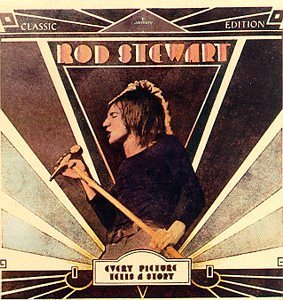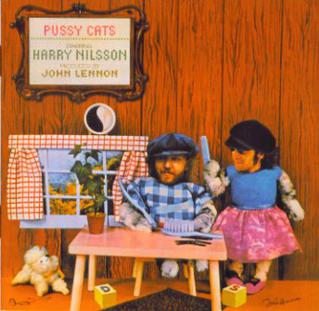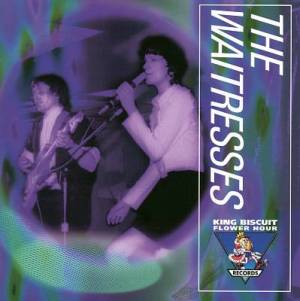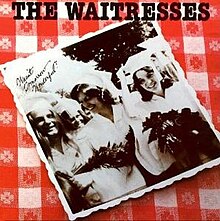
Warren Zevon is the second studio album by American musician Warren Zevon. This album was recorded in 1975 and released on May 18, 1976, by Asylum Records. A remastered version of the album with bonus tracks was released in 2008 by Rhino Records.

Empty Glass is the third solo studio album by English rock musician Pete Townshend, and his first composed of original material, released on 21 April 1980 by Atco Records.

Every Picture Tells a Story is the third studio album by British singer-songwriter Rod Stewart, released on 28 May 1971, by Mercury Records. It incorporates hard rock, folk, and blues styles. It went to number one on both the UK and US charts and finished third in the Jazz & Pop critics' poll for best album of 1971. It has been an enduring critical success, including a number 172 ranking on Rolling Stone's 2003 list of the 500 greatest albums of all time.

After the Gold Rush is the third studio album by the Canadian-American musician Neil Young, released in September 1970 on Reprise Records. It is one of four high-profile solo albums released by the members of folk rock group Crosby, Stills, Nash & Young in the wake of their chart-topping 1970 album Déjà Vu. Young's album consists mainly of country folk music along with several rock tracks, including "Southern Man". The material was inspired by the unproduced Dean Stockwell-Herb Bermann screenplay After the Gold Rush.
The Waitresses were an American new wave band from Akron, Ohio, best known for their singles "I Know What Boys Like" and "Christmas Wrapping." The band released two albums, Wasn't Tomorrow Wonderful? and Bruiseology, and one EP, I Could Rule the World If I Could Only Get the Parts.

Liz Phair is the fourth studio album by the American singer-songwriter Liz Phair, released on June 24, 2003, on Capitol Records. It was produced by Phair, Michael Penn, Pete Yorn, R. Walt Vincent and the Matrix songwriting team.

Pussy Cats is the tenth album by American singer Harry Nilsson, released by RCA Records in 1974. It was produced by John Lennon during his "Lost Weekend" period. The album title was inspired by the bad press Nilsson and Lennon were getting at the time for being drunk and rowdy in Los Angeles. They also included an inside joke on the cover – children's letter blocks "D" and "S" on either side of a rug under a table − to spell out "drugs under the table" as a rebus.

Tracy Ann Wormworth is an American bass guitarist who has played with the B-52s since 1990. She was a member of the Waitresses and has been a session player for numerous acts.

Zipper Catches Skin is the seventh solo studio album by American rock singer Alice Cooper, released in August 1982, by Warner Bros. Records.

Patricia Jean Donahue was the lead singer of the American new wave group The Waitresses, most active in the 1980s. She is best known for the band's singles "I Know What Boys Like" and "Christmas Wrapping".

"Christmas Wrapping" is a Christmas song by the American new wave band the Waitresses. First released on ZE Records' 1981 compilation album A Christmas Record, it later appeared on the band's 1982 EP I Could Rule the World If I Could Only Get the Parts and numerous other holiday compilation albums. It was written and produced by Chris Butler, with vocals by Patty Donahue.

The Blue Mask is the eleventh solo studio album by American rock musician Lou Reed, released in February 1982, by RCA Records. Reed had returned to the label after having left Arista Records. The album was released around Reed's 40th birthday, and covers topics of marriage and settling down, alongside themes of violence, paranoia, and alcoholism.

Bruiseology is the second and final studio album by the American band the Waitresses, released in 1983. The album was recorded amidst personnel conflict; the band disbanded a year later. Chris Butler intended for the album's lyrics and themes to be darker than the band's earlier work. The album was coproduced by Hugh Padgham.

King Biscuit Flower Hour Presents the Waitresses is a live album by the band the Waitresses, recorded in 1982 at My Father's Place in Roslyn, New York, for the radio show King Biscuit Flower Hour. It was released in 1997, less than a year after lead singer Patty Donahue died of lung cancer.

I Could Rule the World If I Could Only Get the Parts is an EP by the Waitresses. It includes the singles "Christmas Wrapping" (1981) and "Square Pegs" (1982); the latter was the theme song of the television series of the same name.

The Good, the Bad, and the Argyle is the debut full-length release by American punk rock band The Bouncing Souls. Released on November 1, 1994, the album runs 31 minutes and 18 seconds, and has 12 songs including covers of The Strangeloves' "I Want Candy," which was renamed to just "Candy", and The Waitresses' "I Know What Boys Like."
"Come Go with Me" is a song written by C. E. Quick, an original member of the American doo-wop vocal group the Del-Vikings. The song was originally recorded by The Del-Vikings in 1956 but not released until July 1957 on the Luniverse LP Come Go with the Del Vikings. The final version was released in the second week of January 1957 and was led by Norman Wright, although some sources claim it was led by Gus Backus. When Joe Averbach, the owner of Fee Bee Records could not handle the demand, he signed with Dot Records in late January 1957; the song became a hit, peaking at No. 5 on the US Billboard Top 100 Pop Chart. It also reached No. 2 on the R&B chart.

20th Century Masters – The Millennium Collection: The Best of the Waitresses is a compilation album from the Waitresses. Released by Polydor Records in 2003, it consists of the same tracks and uses the same running order as a previous compilation, The Best of the Waitresses (1990), minus the songs "Jimmy Tomorrow", "The Smartest Person I Know" and "They're All Out of Liquor, Let's Find Another Party".
Christopher Butler is an American musician, writer, and artist who is best known for leading the 1980s new wave band The Waitresses. His notable songs include "I Know What Boys Like", "No Guilt", "Christmas Wrapping" and the theme song for the TV sitcom Square Pegs.

"I Know What Boys Like" is a song by the Waitresses, written by guitarist Chris Butler in 1978, while he was still a member of the rock band Tin Huey.

















